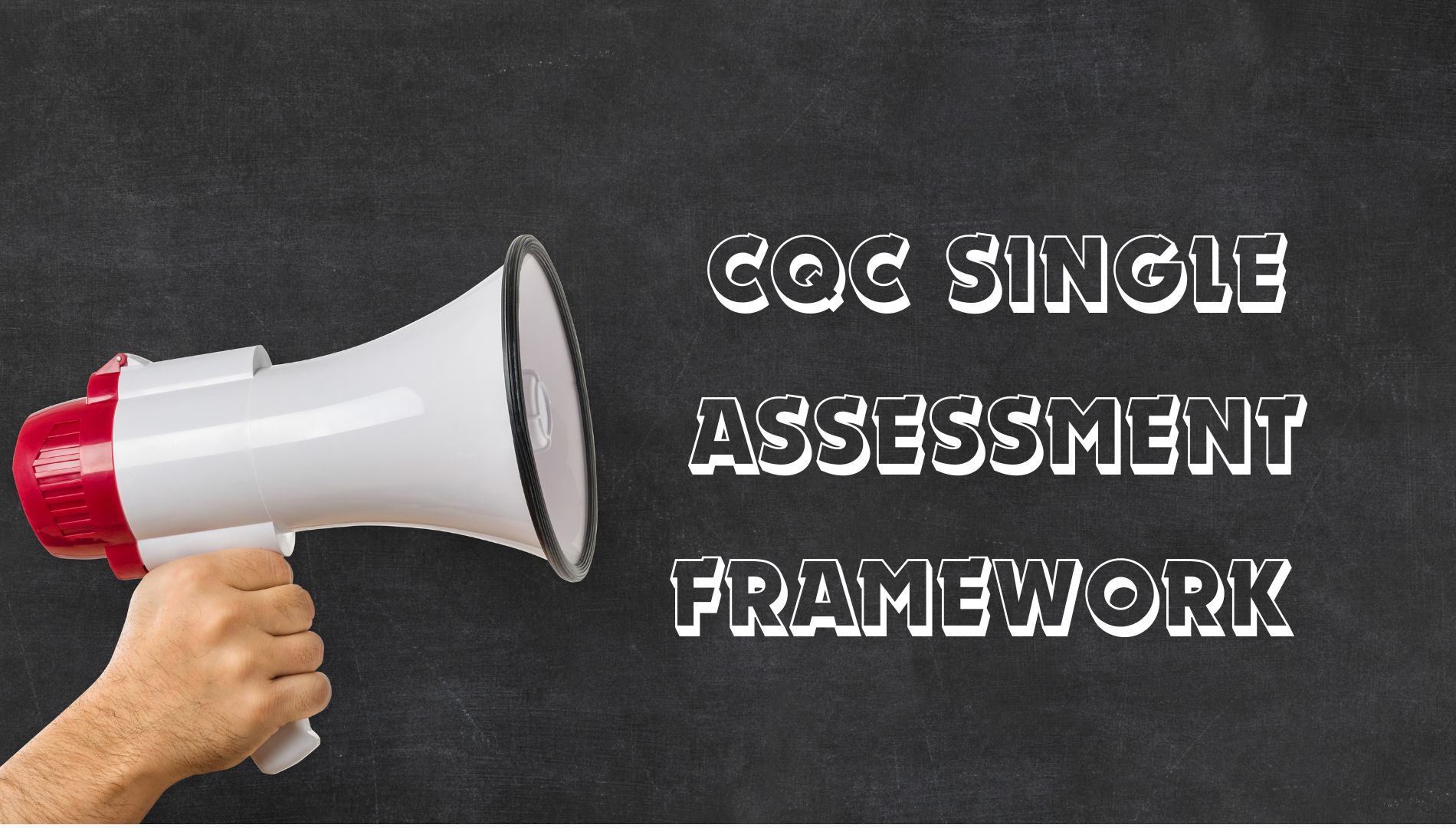CQC plans to roll out use of the Single Assessment Framework on 21st November 2023. This one framework will apply to all sectors registered with CQC. It will also be used to assess local authority commissioning of social care and Integrated Care Systems.
- CQC will assess services on an ongoing basis meaning that ratings can change more frequently.
- The 5 Key Questions and the ratings scale (Outstanding – Inadequate) are not changing.
- Key lines of enquiry (KLOEs) will be replaced with new Quality Statements.
- CQC will be collating evidence under the Quality Statements using six new Evidence Categories.
The same new Framework will be used to assess new services when making applications for registration, as well as ongoing assessment once they are registered.
| Current Approach | New Regulatory Approach |
| Multiple Assessment Frameworks | Single Assessment Framework |
| Ongoing monitoring and with inspections scheduled to previous rating | Ongoing assessment of quality and risk |
| Evidence gathered during onsite inspection (single point in time) | Evidence gathered at multiple points in time (not just through inspection) |
| Judgements and rating decisions made using ratings characteristics | Teams assign scores to evidence |
| Narrative inspective report | Ratings update, short narrative published |
Quality Statements and Evidence Categories
| SAFE | |
| Learning culture. | We have a proactive and positive culture of safety based on openness and honesty, in which concerns about safety are listened to, safety events are investigated and reported thoroughly, and lessons are learned to continually identify and embed good practices. |
| Safe systems, pathways and transitions. | We work with people and our partners to establish and maintain safe systems of care, in which safety is managed, monitored and assured. We ensure continuity of care, including when people move between different services. |
| Safeguarding. | We work with people to understand what being safe means to them as well as with our partners on the best way to achieve this. We concentrate on improving people’s lives while protecting their right to live in safety, free from bullying, harassment, abuse, discrimination, avoidable harm and neglect. We make sure we share concerns quickly and appropriately. |
| Involving people to manage risks. | We work with people to understand and manage risks by thinking holistically so that care meets their needs in a way that is safe and supportive and enables them to do the things that matter to them. |
| Safe environments. | We detect and control potential risks in the care environment. We make sure that the equipment, facilities and technology support the delivery of safe care. |
| Safe and effective staffing. | We make sure there are enough qualified, skilled and experienced people, who receive effective support, supervision and development. They work together effectively to provide safe care that meets people’s individual needs. |
| Infection prevention and control. | We assess and manage the risk of infection. We detect and control the risk of it spreading and share any concerns with appropriate agencies promptly. |
| Medicines optimisation. | We make sure that medicines and treatments are safe and meet people’s needs, capacities and preferences by enabling them to be involved in planning, including when changes happen. |
| EFFECTIVE | |
| Assessing needs. | We maximise the effectiveness of people’s care and treatment by assessing and reviewing their health, care, wellbeing and communication needs with them. |
| Delivering evidence-based care and treatment. | We plan and deliver people’s care and treatment with them, including what is important and matters to them. We do this in line with legislation and current evidence-based good practice and standards. |
| How staff, teams and services work together. | We work effectively across teams and services to support people. We make sure they only need to tell their story once by sharing their assessment of needs when they move between different services. |
| Supporting people to live healthier lives. | We support people to manage their health and wellbeing so they can maximise their independence, choice and control. We support them to live healthier lives and where possible, reduce their future needs for care and support. |
| Monitoring and improving outcomes. | We routinely monitor people’s care and treatment to continuously improve it. We ensure that outcomes are positive and consistent, and that they meet both clinical expectations and the expectations of people themselves. |
| Consent to care and treatment. | We tell people about their rights around consent and respect these when we deliver person-centred care and treatment. |
| CARING | |
| Kindness, compassion and dignity. | We always treat people with kindness, empathy and compassion and we respect their privacy and dignity. We treat colleagues from other organisations with kindness and respect. |
| Treating people as individuals. | We treat people as individuals and make sure their care, support and treatment meets their needs and preferences. We take account of their strengths, abilities, aspirations, culture and unique backgrounds and protected characteristics. |
| Independence, choice and control. | We promote people’s independence, so they know their rights and have choice and control over their own care, treatment and wellbeing. |
| Responding to people’s immediate needs. | We listen to and understand people’s needs, views and wishes. We respond to these in that moment and will act to minimise any discomfort, concern or distress. |
| Workforce wellbeing and enablement. | We care about and promote the wellbeing of our staff, and we support and enable them to always deliver person centred care. |
| RESPONSIVE | |
| Person-centred care. | We make sure people are at the centre of their care and treatment choices and we decide, in partnership with them, how to respond to any relevant changes in their needs. |
| Care provision, integration, and continuity. | We understand the diverse health and care needs of people and our local communities, so care is joined-up, flexible and supports choice and continuity. |
| Providing information. | We provide appropriate, accurate and up-to-date information in formats that we tailor to individual needs. |
| Listening to and involving people. | We make it easy for people to share feedback and ideas or raise complaints about their care, treatment and support. We involve them in decisions about their care and tell them what’s changed as a result. |
| Equity in access. | We make sure that everyone can access the care, support and treatment they need when they need it. |
| Equity in experiences and outcomes. | We actively seek out and listen to information about people who are most likely to experience inequality in experience or outcomes. We tailor the care, support and treatment in response to this. |
| Planning for the future. | We support people to plan for important life changes, so they can have enough time to make informed decisions about their future, including at the end of their life. |
| WELL-LED | |
| Shared direction and culture. | We have a shared vision, strategy and culture. This is based on transparency, equity, equality and human rights, diversity and inclusion, engagement, and understanding challenges and the needs of people and our communities in order to meet these. |
| Capable, compassionate and inclusive leaders. | We have inclusive leaders at all levels who understand the context in which we deliver care, treatment and support and embody the culture and values of their workforce and organisation. They have the skills, knowledge, experience and credibility to lead effectively. They do so with integrity, openness and honesty. |
| Freedom to speak up. | We foster a positive culture where people feel that they can speak up and that their voice will be heard. |
| Workforce equality, diversity and inclusion. | We value diversity in our workforce. We work towards an inclusive and fair culture by improving equality and equity for people who work for us. |
| Governance, management and sustainability. | We have clear responsibilities, roles, systems of accountability and good governance. We use these to manage and deliver good quality, sustainable care, treatment and support. We act on the best information about risk, performance and outcomes, and we share this securely with others when appropriate. |
| Partnerships and communities. | We understand our duty to collaborate and work in partnership, so our services work seamlessly for people. We share information and learning with partners and collaborate for improvement. |
| Learning, improvement and innovation. | We focus on continuous learning, innovation and improvement across our organisation and the local system. We encourage creative ways of delivering equality of experience, outcome and quality of life for people. We actively contribute to safe, effective practice and research. |
| Environmental sustainability – sustainable development. | We understand any negative impact of our activities on the environment and we strive to make a positive contribution in reducing it and support people to do the same |



